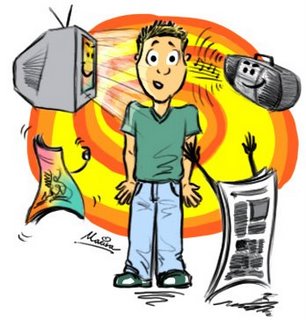Effects of mass media on society
Effects of Mass Media can be definedas any change induced directly or indirectly through newspapers, films, radioand television. In the 19th century, the communication experts were of the viewthat access by the mass of population to the printed word might turn docilityinto uprising. The new man medium of cinema was similarly accused of wide rangeof effects while T.V. in the eyes of some is responsible for many of the illsof our time as though such media could be somehow divorced from social,political and cultural environments which produce them.
The timing of communication process,writes C.Seymour-Ure in the Political Impact of Mass Media (UK contable, 1974),is probably one of the most important determinants of mass media effects. Ifthe timing is right, the media can often be the arbiter of crisis, by being inthe most prominent position to define it. Because, of the agenda settingtechnique, the media may influence public opinion by determining the priorityand importance and less importance of an issue by its own criteria.
According to James Watson and AnneHill hypotheses about effects : “A few generalized hypothesis aboutaffects can be tentatively posited : the media are probably more likely tomodify and reinforce attitudes than change them; Media impact will be greateramong the uncommitted than the committed; impact will be greater if all themedia are saying more or less the same thing at the same time (Consistency) ;equally if the media are concentrating on a small rather than diverse number ofstories (Intensity) and if they are repeating messages, images, viewpoints overand over again (Frequency).”
